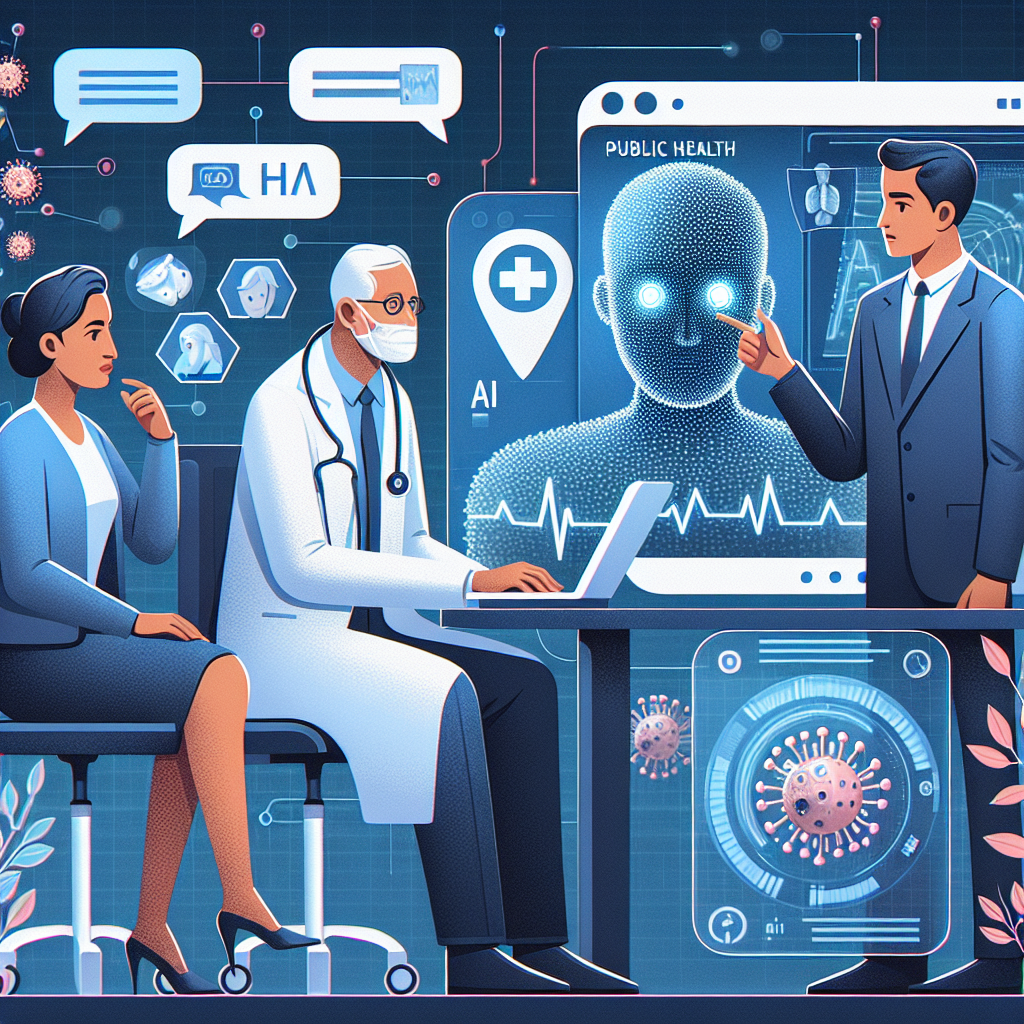Artificial Intelligence (AI) has been increasingly utilized in various industries to improve efficiency, accuracy, and decision-making processes. In the field of public health management, AI has the potential to revolutionize the way health data is analyzed, monitored, and utilized to enhance health outcomes for communities. This article will explore the use of AI in public health management, its benefits, challenges, and future prospects.
**Benefits of AI in Public Health Management:**
1. **Early Detection and Monitoring of Diseases:** AI algorithms can analyze vast amounts of health data in real-time to detect patterns and trends that may indicate the outbreak of a disease. This can help public health officials to take proactive measures to prevent the spread of the disease and protect the population.
2. **Predictive Analytics:** AI can be used to predict the spread of diseases based on various factors such as population density, travel patterns, and environmental conditions. This can help public health agencies to allocate resources more efficiently and effectively to control the spread of diseases.
3. **Personalized Medicine:** AI can analyze individual health data to provide personalized treatment plans and recommendations for patients. This can improve the accuracy of diagnoses, reduce healthcare costs, and improve patient outcomes.
4. **Healthcare Resource Allocation:** AI can help public health agencies to allocate healthcare resources such as medical personnel, equipment, and medications more effectively based on real-time data analysis. This can ensure that resources are deployed where they are most needed to address public health emergencies.
5. **Improved Data Security:** AI can enhance data security measures to protect sensitive health information from cyber threats and breaches. This is crucial for maintaining the privacy and confidentiality of healthcare data.
**Challenges of AI in Public Health Management:**
1. **Data Privacy Concerns:** The use of AI in public health management raises concerns about the privacy and security of health data. Public health agencies must ensure that strict data protection measures are in place to safeguard sensitive information.
2. **Bias and Discrimination:** AI algorithms may inherit biases from the data used to train them, leading to discriminatory outcomes. Public health agencies must address bias in AI algorithms to ensure fair and equitable healthcare services for all.
3. **Lack of Technical Expertise:** Public health agencies may lack the technical expertise and resources to implement AI solutions effectively. Training and capacity-building initiatives are needed to enable public health professionals to leverage AI technologies.
4. **Regulatory Challenges:** The use of AI in public health management may raise regulatory challenges related to data governance, transparency, and accountability. Clear guidelines and regulations are needed to govern the use of AI in healthcare.
5. **Integration with Existing Systems:** Integrating AI solutions with existing public health management systems may be complex and time-consuming. Public health agencies must ensure seamless integration to maximize the benefits of AI in healthcare.
**Future Prospects of AI in Public Health Management:**
1. **Enhanced Disease Surveillance:** AI can improve disease surveillance systems by analyzing diverse data sources such as social media, wearable devices, and electronic health records. This can enable early detection of disease outbreaks and timely response strategies.
2. **Telemedicine and Remote Monitoring:** AI can facilitate telemedicine services and remote monitoring of patients to provide healthcare access to underserved populations. This can improve healthcare outcomes and reduce healthcare disparities.
3. **Precision Public Health:** AI can enable precision public health interventions by targeting specific populations based on their unique health needs and risk factors. This can optimize the allocation of resources and improve health outcomes at the individual and community levels.
4. **Healthcare Automation:** AI can automate routine administrative tasks in healthcare settings to free up healthcare professionals’ time for patient care. This can enhance operational efficiency and reduce healthcare costs.
5. **Collaborative Research:** AI can facilitate collaborative research efforts among public health agencies, researchers, and healthcare providers to address complex health challenges. This can accelerate the development of innovative solutions and improve public health outcomes.
**FAQs:**
**1. How is AI being used in disease surveillance and outbreak detection?**
AI algorithms can analyze diverse data sources such as social media, electronic health records, and environmental data to detect patterns and trends that may indicate the outbreak of a disease. This can enable public health agencies to take proactive measures to prevent the spread of diseases and protect the population.
**2. How can AI improve personalized medicine in public health management?**
AI can analyze individual health data such as genetic information, medical history, and lifestyle factors to provide personalized treatment plans and recommendations for patients. This can improve the accuracy of diagnoses, reduce healthcare costs, and improve patient outcomes.
**3. What are the privacy concerns related to the use of AI in public health management?**
The use of AI in public health management raises concerns about the privacy and security of health data. Public health agencies must ensure that strict data protection measures are in place to safeguard sensitive information and prevent unauthorized access.
**4. How can public health agencies address bias in AI algorithms?**
Public health agencies can address bias in AI algorithms by conducting bias assessments, diversifying training data, and implementing transparency and accountability measures. This can ensure fair and equitable healthcare services for all populations.
**5. What are the regulatory challenges associated with the use of AI in public health management?**
The use of AI in public health management may raise regulatory challenges related to data governance, transparency, and accountability. Clear guidelines and regulations are needed to govern the use of AI in healthcare and protect the privacy and security of health data.
In conclusion, AI has the potential to transform public health management by enhancing disease surveillance, personalized medicine, resource allocation, and healthcare automation. While there are challenges to overcome, the future prospects of AI in public health management are promising. Public health agencies must embrace AI technologies and collaborate with stakeholders to harness the full potential of AI in improving health outcomes for communities.

